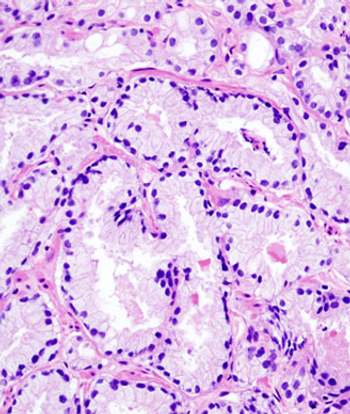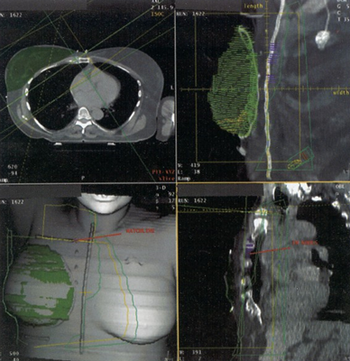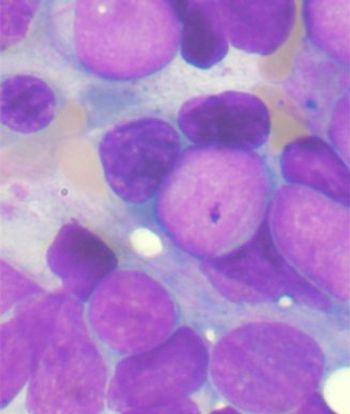
An analysis of clinical trials suggests that the site of a prostate cancer patient’s metastases can predict survival following treatment with docetaxel.

Your AI-Trained Oncology Knowledge Connection!


An analysis of clinical trials suggests that the site of a prostate cancer patient’s metastases can predict survival following treatment with docetaxel.

A phase I trial that combined the investigational therapy cabozantinib with the already approved abiraterone acetate in metastatic castration-resistant prostate cancer patients shows that the two agents are tolerable, with the potential for improved efficacy.

Metastatic breast cancer patients with insulin resistance have a significantly worse prognosis, according to the results of a study presented at the 2014 ASCO Annual Meeting.

The combined analysis of two phase III clinical trials shows that exemestane, an aromatase inhibitor, may better prevent breast cancer recurrence in women with early-stage hormone receptor–positive breast cancer, as compared with tamoxifen.

Results from the phase III E3805 clinical trial show that adding docetaxel to standard hormone therapy extends survival for men with metastatic hormone-sensitive prostate cancer by 13.6 months.

The results of a prospective study showed that the risk of developing melanoma is higher for white women with a history of strong sun exposure during childhood and adolescence, rather than adulthood.

A follow-up analysis of gene expression signatures from the CALGB 40601 trial shows that certain HER2-positive early-stage breast cancer patients may not benefit from more aggressive chemotherapy treatments as part of a neoadjuvant regimen, and that patients with HER2-enriched tumors responded best to dual anti-HER2 treatment.

A new study shows that women diagnosed with cancer in one breast often opt to undergo a contralateral prophylactic mastectomy, even though they may not have a significant risk of developing cancer in the other breast.

A blood-based test of four biomarkers including CA 19-9 may help clinicians diagnose pancreatic cancer at an earlier stage.

Detectable circulating tumor cells in early breast cancer patients can predict prognosis, according to a newly published study.

An analysis of early-stage breast cancer shows that obesity raises the risk of dying from breast cancer for pre-menopausal women diagnosed with ER-positive disease.

A large study shows that prostate cancer patients who had a PSA-based relapse could delay androgen deprivation therapy until symptoms presented, without affecting long-term survival.

Researchers at the Moffitt Cancer Center have created a computational model to simulate the bone metastasis process and to predict the outcomes of specific prostate cancer therapies.

A meta-analysis of over 15,000 patients with liver cirrhosis who were diagnosed with hepatocellular carcinoma demonstrates the benefit of screening these patients for liver tumors.

Low testosterone levels may indicate disease worsening in men diagnosed with low-risk prostate cancer who are being evaluated by active surveillance, according to a new study.

With the goal of helping to standardize and optimize care, ASCO has issued two new clinical guidelines on treating patients with HER2-positive breast cancer.

A retrospective analysis found that breast cancer patients with advanced disease are 1.6 times more likely to incur postoperative complications compared with early-stage patients.

Breast cancer patients who had an axillary lymph node dissection had more complications compared with those who underwent radiotherapy for node-positive disease.

In a recent study, the drug tadalafil (Cialis) did not improve erectile function in men undergoing radiation therapy for prostate cancer.

ASCO has released guidelines for the prevention and management of symptoms such as anxiety, depression, fatigue, and neuropathies, which affect many cancer survivors.

A new study shows that people with high levels of the 15-PGDH enzyme who used aspirin regularly were half as likely to be diagnosed with colorectal cancer.

This slide show features some of the highlights from the 105th Annual Meeting of the American Association for Cancer Research (AACR).

Patients with localized prostate cancer treated with primary androgen deprivation therapy (ADT) without radiation therapy or surgery derived no survival benefit, according to the results of a large study.

A new pilot study demonstrates the ability of a blood-based test to detect metastatic breast cancer recurrence with high sensitivity and specificity.

This slide show includes highlights from the 2014 Society of Gynecologic Oncology annual meeting, including one study showing bariatric surgery could lower the risk of uterine cancer, and another that found a PARP inhibitor active in BRCA-positive ovarian cancer.

A high body mass index prior to a colorectal cancer diagnosis is linked to a higher risk of death, even when the patient’s tumor type is generally associated with a better prognosis.

Two early trials studying CDK inhibitors in metastatic breast cancer have shown impressive activity in HR-positive disease, according to data presented at the AACR annual meeting.

In a phase I trial, non–small-cell lung cancer (NSCLC) patients with tumors that expressed PD-L1 had significantly better outcomes with MK-3475 therapy compared with patients with PD-L1–negative tumors.

New trial results show that a novel, oral metabolic inhibitor has demonstrated early activity in relapsed or refractory acute myeloid leukemia (AML), according to data presented at the annual meeting of the American Association of Cancer Research.

A noninvasive DNA methylation test using urine samples from patients with non–muscle-invasive bladder cancer can detect cancer recurrence. The test demonstrated both specificity and sensitivity in detecting recurrence.